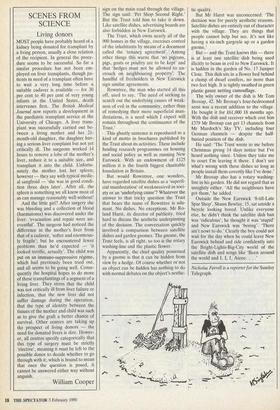SCENES FROM SCIENCE
Living donors
MOST people have probably heard of a kidney being donated for transplant by a living person, usually a close relation of the recipient. In general the proce- dure seems to be successful. So far a similar procedure has not been em- ployed on liver transplants, though pa- tients in need of a transplant often have to wait a very long time before a suitable cadaver is available — for 30 per cent to 40 per cent of very young infants in the United States, death intervenes first. The British Medical Journal now reports a development in the paediatric transplant service at the University of Chicago. A liver trans- plant was successfully carried out be- tween a living mother and her 21- month-old daughter, the daughter hav- ing a serious liver complaint but not yet critically ill. The surgeons worked 14 hours to remove a lobe of the mother's liver, reduce it to a suitable size, and transplant it into the child. Unfortu- nately the mother lost her spleen; however — they say with typical medic- al sangfroid — 'she was in good condi- tion three days later'. After all, the spleen is something we all know most of us can manage reasonably well without!
And the little girl? After surgery she was bleeding and a collection of blood (haematoma) was discovered under the liver: 'evacuation and repair were un- eventful'. The surgeon had noticed the difference in the mother's liver from that of a cadaver, 'softer and enormous- ly fragile'; but he encountered fewer problems than he'd expected — 'it looked terrific, actually'. The child was put on an immuno-suppressive regime, which had previously been tried out, and all seems to be going well. Conse- quently the hospital hopes to do more of these transplantings of a segment of a living liver. They stress that the child was not critically ill from liver failure or infection, that the new liver did not suffer damage during the operation, that the type of identity between the tissues of the mother and child was such as to give the graft a better chance of survival. Other centres are taking up the prospect of living donors — the need for donated livers is dire. Howev- er, all centres specify categorically that this type of surgery must be strictly 'elective', meaning it must be left to the possible donor to decide whether to go through with it; which is bound to mean that once the question is posed, it cannot be answered either way without anguish.
William Cooper


















































 Previous page
Previous page